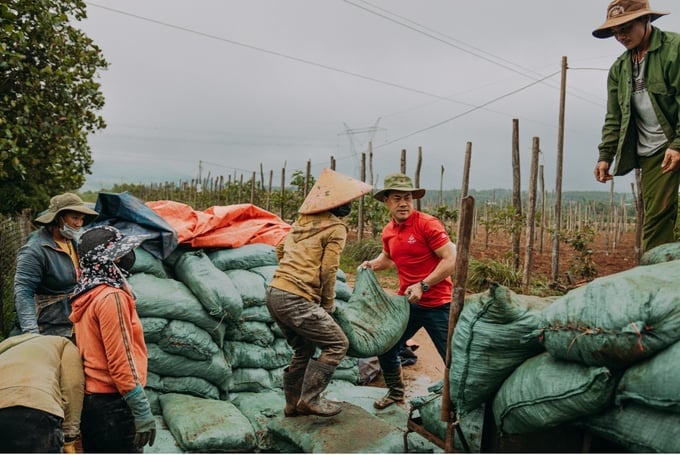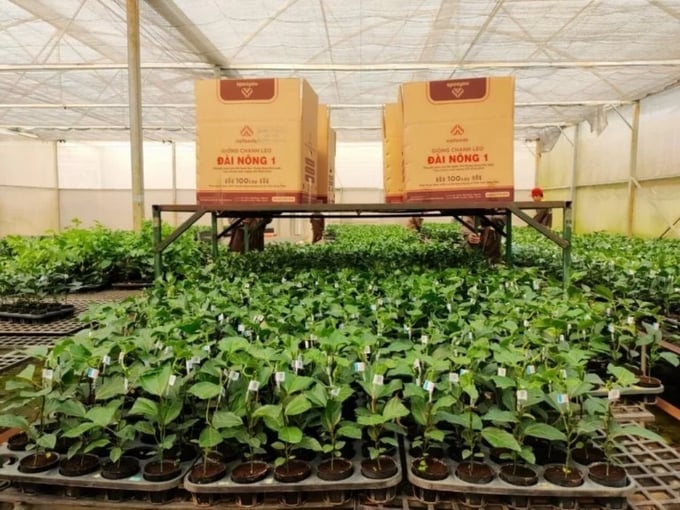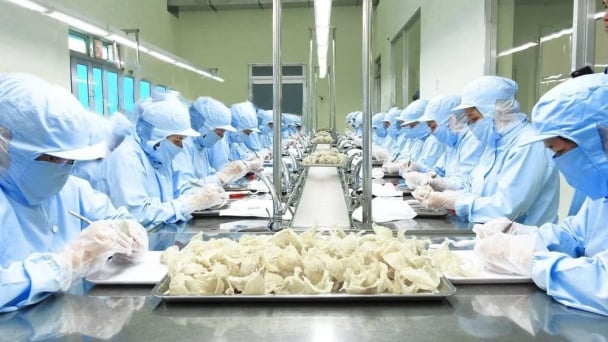May 16, 2025 | 10:36 GMT +7
May 16, 2025 | 10:36 GMT +7
Hotline: 0913.378.918
May 16, 2025 | 10:36 GMT +7
Hotline: 0913.378.918

Many gardeners affiliated with Nafoods still believe in the economic path with passion fruit trees, improving the land ready for the new crop. Photo: Thu Hai.
After enduring months of hardship due to a drastic decline in passion fruit prices, farmers faced a disheartening situation, leading some to abandon their orchards. High costs for wages, agricultural materials, and fertilizers coupled with insufficient returns exacerbated their struggles. The grim situation in raw material output is not only affecting farmers; every individual and entity within the passion fruit industry's supply chain is grappling with challenges, with each side anxiously awaiting a positive turn in the market.
In the current oversupply, passion fruit processing factories like Nafoods Tay Nguyen, Doveco, and others are overwhelmed and struggling to meet production demands. The receipt of goods has slowed down, and trucks laden with passion fruits line the roads leading to processing plants, some parked even without scheduled arrival times.
Mr. Tam, a seasoned truck driver with over 10 years of experience, shared his challenges, saying, "I've been a cargo carrier for more than 10 years. With the substantial growth of passion fruit in Gia Lai in recent years, transporting this fruit to traders and factories in the Central Highlands has become challenging. Waiting times for unloading have significantly increased, with some days taking more than 20 hours for my vehicle to unload."
The current passion fruit prices show no improvement, leading many farmers to abandon their orchards or seek alternative crops for survival.
Mr. Nguy Duc Minh, Seedling Sales Director at Nafoods Passion Fruit Joint Stock Company, shared insights into the challenges faced by companies providing passion fruit seedlings. In response to the prevailing situation, large-scale seed-plant export has become impractical. However, Nafoods has adopted a collaborative approach, forming partnerships with cooperatives and farmers to establish a sustainable three-tiered chain. The company supplies high-quality and technically sound seedlings, farmers focus on cultivation, and Nafoods purchases fresh passion fruits for processing. This integrated approach allows farmers in growing areas to cultivate confidently, free from concerns about output. Following the guidance of Nafoods technicians, who adhere to European export standards and VietGAP, the quality remains stable, ensuring favorable prices in the market.
Nafoods stands out as a pioneering business committed to the long-term cultivation of passion fruit trees. Recognizing the pivotal role of research, the company has invested in a molecular biotechnology laboratory system at the Nafoods Agricultural Research and Development Institute. This investment enables Nafoods to provide the market with top-quality seedlings, thanks to the strict application of virus control technology in their state-of-the-art seed gardens.
Nafoods has successfully researched and obtained exclusive protection certificates for three new passion fruit varieties: Que Phong 1, Bach Huong 1, and Nafoods 1. These varieties have a protection period of 20 years, as per Decision No. 192/QD-TT-VPBH dated June 21, 2019; No. 193/QD-TT-VPBH dated June 24, 2019; and No. 195/QD-TT-VPBH dated June 25, 2019, issued by the Director of the Department of Crop Production (MARD).
Emphasizing a long-term commitment to passion fruit trees and supporting farmers, Nafoods focuses on investing in facilities and producing high-quality seedlings as a core strategic objective.
Continuing its commitment to farmers' well-being, Nafoods consistently explores new avenues to expand production and processing capabilities from fresh fruit raw materials. This proactive approach ensures that farmers can rely on a secure product output. Consequently, cooperatives affiliated with Nafoods continue to operate steadfastly, even in the face of numerous abandoned orchards.
In the current landscape of the Central Highlands, many farmers have shifted away from cultivating passion fruit trees, resulting in a decline in the once-thriving industry. In response to this shift, Nafoods finds greater confidence in establishing a three-tiered chain involving Enterprises, Cooperatives, and Farmers.
During the signing ceremony of cooperation agreements with cooperatives and farmers, Mr. Ho Hai Quan, Director of the Central Highlands growing region at Nafoods Group Joint Stock Company, emphasized the company's commitment to collaboration and cooperation in developing growing regions. The goal is to implement an agricultural product purchasing policy that instills confidence in farmers regarding their production.
Mr. Quan stressed the importance of sustainable and planned development for farmers' cultivation and the consumption of fresh fruit products, marking key aspects of Nafoods' strategy.
Addressing the complexity of the passion fruit seedling market, with numerous spontaneous production establishments and widespread counterfeit goods bearing major brands, Nafoods faces challenges impacting the reputation of reputable seedling suppliers.
Recognizing this issue as a collective challenge, Mr. Quan highlighted the need for collaborative efforts across all stakeholders. Regulatory departments and agencies are urged to impose strong sanctions on establishments involved in counterfeiting and distributing poor-quality seeds under the guise of major brands. Licensed production units are encouraged to commit to providing high-quality products with clear traceability. In turn, farmers are advised to choose seedlings from reputable brands, contributing to the avoidance of subpar, dumped seedlings and fostering the consumption of quality products.
Nafoods has actively collaborated in passion fruit cultivation with 28 cooperatives and 2,000 farming households, covering over 2,200 hectares. The company plans to further extend passion fruit cultivation to four key provinces in the Central Highlands – Gia Lai, Dak Lak, Dak Nong, and Lam Dong – aiming to surpass 10,000 hectares by 2028. This expansion is geared towards providing passion fruit farmers with essential market information, standardized farming techniques, and a stable output.
Recognizing the crucial role of up-to-date market information, farmers are encouraged to leverage agricultural news sources, market newsletters, and relevant regional agricultural organizations. The passion fruit industry's growth hinges on the synchronization of information flow among businesses, cooperatives, farmers, and local agencies. This collaborative effort ensures stakeholders are well-informed about market trends, price fluctuations, and other pertinent issues related to passion fruit varieties. Such synchronized information empowers farmers to confidently approach their cultivation, ultimately contributing to a successful harvest.
In a recent development, the General Department of Market Management under the Ministry of Industry and Trade reported that the Market Management Department of Gia Lai province imposed a fine of 80 million VND on Bazan Passion Fruit Investment and Development Company Limited. This penalty was levied due to the company falsifying the origin of passion fruit seedlings. The inspection, conducted by Market Management Team No. 3 in collaboration with the Economic Police Team in Chu Prong District, Gia Lai province, revealed these fraudulent activities during a surprise inspection at the company's address in Ia Bang commune, Chu Prong district, Gia Lai province, directed by Mr. T.V.Ng.

In 2021, Nafoods implemented a new initiative involving origin traceability stamps.
During an inspection, the team uncovered workers at Bazan Passion Fruit Investment and Development Company Limited packing passion fruit seedlings into cartons marked with the words "TAI SHIANG - MADE TAIWAN." Of the packed seedlings, 700 were already boxed, while an additional 250 awaited packaging.
Further investigation revealed that Mr. Ng., the company representative, had purchased passion fruit seedlings from SeSan Gia Lai Agriculture Company Limited. These seedlings originated from Chiameei International Biotechnology Company Limited, located in Lac Truong village, Tu Tra commune, Don Duong district, Lam Dong province. The seedlings had received approval for circulation from the Department of Agriculture and Rural Development of Lam Dong province. Subsequently, the seedlings were gathered at the premises of Bazan Passion Fruit Company, where hired workers packed them into carton boxes bearing the words "TAI SHIANG - MADE IN TAIWAN" for sale as per customer requirements.
Historically, passion fruit growing areas in the Central Highlands primarily featured the Tai Nong 1 variety imported from Taiwan (commonly known as the Taiwanese variety, Tai Shisang, or Tai One). This variety, recognized for its standardization, high yields, and quality control, faced challenges due to widespread counterfeiting. Over the years, farmers experienced substantial losses, with certain years witnessing a scarcity of the "Tai Shiang variety."
Despite the imposed fine of 80 million VND, the deterrent effect appears insufficient, as the trade of counterfeit passion fruit varieties continues openly on social networks in the Central Highlands. Addressing this issue demands ongoing efforts from various stakeholders to enforce stricter measures and combat the persistence of fraudulent practices in the market.
Translated by Quynh Chi

(VAN) Japan's efforts to lower the price of rice through the release of its stockpile may finally be making some progress, albeit at a snail's pace.

(VAN) U.S. tariffs are not only a 'shock', but also an opportunity for Vietnamese businesses to renew their mindset toward comprehensive development.

(VAN) As Bac Giang lychee enters the harvest season, Minister Do Duc Duy expects that the fruit will contribute greatly to agricultural exports due to standardized production and deep processing.

(VAN) Consumers have shown a preference for free-range eggs, but those farming systems are more vulnerable to biosecurity risks like bird flu.
/2025/05/09/5701-1-184335_301.jpg)
(VAN) Vietnam’s eel exports nearly doubled thanks to a mud-free farming model, opening up new prospects while still facing numerous barriers related to international standards.

(VAN) Minister Do Duc Duy warned that if production is not professionalized and supply chains are not transparent, the U.S. market could become a growth bottleneck.

(VAN) Delegating surveillance responsibilities to local authorities is a cost-saving and efficiency-boosting measure that removes a key bottleneck for enterprises, according to Director General Duong Tat Thang.